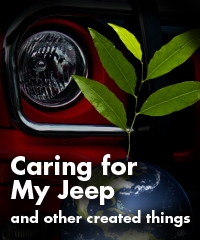Sometimes we need to take a break from the books to see the sky and the little things in the grass at our feet.
Caring for my Jeep and other created things

In college I drove a cool, red soft-top Jeep. My experience as a Jeep owner gave me some insights into how we take care of our stuff — and why it matters to God, the Creator of it all.
I believe there is something special about red Jeeps. So does my wife. Long before she knew me, she had declared to her dad that she was going to marry the first cute guy she met with a red Jeep. Well, I qualified for the “red Jeep” part, anyway!
At any rate, I loved this little red Jeep. But I loved my friends even more. If someone needed to drive it somewhere, I was glad to lend out the keys.
My friends were welcome to drive it — even take the top off. But the people closest to me knew that I loved my Jeep. And what I found was that the ones who knew me best were the most generous — refilling the tank with gas, for example. Those who knew me best took the best care of my stuff; they did so because they knew me and knew that I loved my Jeep.
So it is with those of us who call ourselves Christians and this whole eye-roll-inducing conversation in some circles about how involved we should be in issues of ecology and creation care.
Taking care of our environment is important because we know the One who owns the place. He has lent it to us, granted us temporary and bounded power over all that he has created. And he commands us to care for it and tend it.
The Bible states clearly, “The earth is the Lord’s and all that is in it” (Psalm 24:1). As Christians, we should be out front in issues of creation care because we know the Owner. We know that he loves people more than animals and plants, but not at the final expense of animals and plants. As people who know the Owner and who have been given a sacred trust, we respect what is his and we care for it, even at great cost to ourselves.
Caring for God’s creation involves understanding what is truly happening. And this gets admittedly confusing. There are people who believe reports that the environmental situation is as bad as possible, and there are those who would prefer to ignore even common-sense calls to conservation and caution.
But the bottom line as Christians is that we shouldn’t be wrangling over whether or not we’re on the verge of a catastrophe. We know the Lord. We are to respect and honor his stuff.
If we don’t do that, we sin against him and our vision of what it means to be Christians is too narrow. My prayer is that, as Christians in a global community, we will wake up and take seriously what it means to honor God by caring for the earth he gave us.
—Alex Kirk
Recommended resources:
Keeping God’s Earth, just published from InterVarsity Press, brings together a team of scholars who offer biblical insights and scientific expertise to provide a deeper understanding and clear guidance on the most important environmental issues facing us.
Our Father’s World, by Edward R. Brown, offers a biblical framework for creation care and practical steps that ordinary Christians can take to exercise good ecological stewardship.
Author Ben Lowe wrote Green Revolution for those who want to make a difference by mobilizing together as a movement and combining for community action to care for God’s earth.






